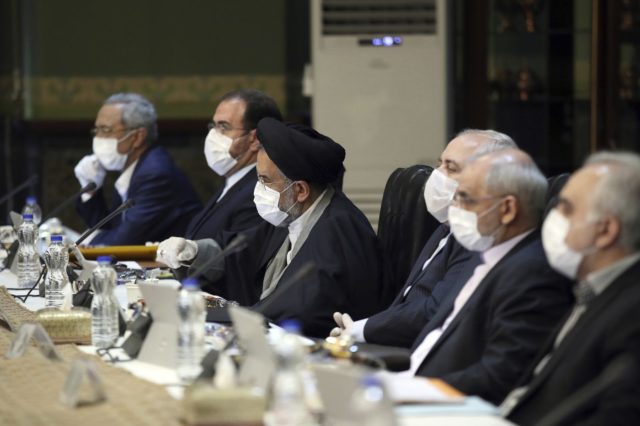Event Date: April 22, 2020
“The situation in Iran is dire” as a result of the coronavirus pandemic. But in the short run Iran’s health crisis may strengthen the ruling ayatollahs’ grip on power, said Ilan Berman, senior vice president of the American Foreign Policy Council. In the long run, the effects of the illness could stimulate a shift in power, though not necessarily toward a less dictatorial regime.
Supreme Leader Ayatollah Ali Khamenei’s government claims approximately 4,500 to 5,000 Iranians have died from COVID-19, the disease associated with the novel coronavirus, and roughly 70,000 of the country’s 80 million people have been infected, Berman told a Jewish Policy Center conference call on April 22. But opposition sources estimated “as many as 500,000 people have been infected” and “fatalities at upwards of 30,000.”“Mass graves visible from space,” Berman said, suggest “there seems to be a large-scale regime cover-up” underway.
Berman is an expert on the Middle East and Russia. His analyses have appeared in The Wall Street Journal, New York Times, Foreign Affairs and elsewhere.
He said the Iranian government initially seized on the pandemic as a political opportunity rather than addressing it as a public health threat. Ruling clerical elites took a “cavalier” attitude toward social distancing, and delegated decision-making to lower-ranking clergy. The latter at first kept Shi’ite Islamic shrines open, including those in the holy city of Qom that “emerged as hot spots” of infection.
Iran announced a ban on flights to China, where the novel coronavirus first spread, on January 31. But Mahan Airlines—connected to Iran’s Islamic Revolutionary Guard Corps—made more than 50 additional flights to Chinese destinations through late February, Berman noted.
Such political rather than public health choices highlight “the division between [Iran’s] younger, secular population and a clerical elite that seems to be out of touch,” he said.
Made in China
The ruling mullahs rely on their China connection, Berman added. “Over the years China has emerged as [Iran’s] economic lifeline” in the face of renewed “maximum pressure” trade and finance sanctions by the United States under the Trump administration. But the pandemic-caused global economic contraction and collapse of international oil markets, and “an almost seismic global shift away from [doing business with] China” might induce Beijing to get tougher on delinquent client states while Iran grows, even more, cash short, he said.
Initially dismissing the public health danger, Iran’s leaders “moved very rapidly” politically, Berman stated. They engaged in anti-American propaganda; bolstered the Islamic Revolutionary Guard Corps, the regime’s main tool of internal control and external subversion; and fanned conspiracy theories, including that the United States directed the virus against the Iranian people.
But as the effects of the pandemic become clearer inside the country, the political situation grows both fragile and potentially explosive, Berman said. Regime leadership is particularly vulnerable to COVID-19, he noted, since it is uniformly older, with many individuals in their 70s, 80s, and 90s.
“Khamenei is 80 and immuno-compromised,” he noted. “The Washington Post in early March reported two dozen members of the upper echelon had died,” Berman said, “with opposition groups saying more than 100 political and military leaders have died.”
In any case, the pandemic’s ravages inside Iran don’t support the argument current U.S. economic sanctions should be relaxed, he asserted. “Existing sanctions already have a carve out for humanitarian relief,” Berman noted. And Supreme Leader Khamenei reportedly controls asserts worth $200 billion, apparently none of which has been released to support public health in Iran.
The clerical regime has granted the IRGC “more power and status to deal with the crisis.” Berman said this is not good news for demonstrators who had turned out around the country before the pandemic to protest deteriorating economic conditions and, at times, their rulers’ expansionist foreign policies in Iraq, Syria, Lebanon, Yemen and even support for Hamas (the Palestinian Islamic Resistance Movement—a U.S.-designated terrorist organization).
Berman said the theory that Iran was moving from its clergy-led government to a military dictatorship under the IRGC “has been around for more than a decade.” Even if more likely now, it probably would mean a regime “just less ideological, more predictable in military terms” but “not mean one any less brutal in clamping down” on public opposition.
Holding the Nuclear Card
The IRGC, separate from Iran’s traditional military, controls an estimated one-third of the country’s economy, Berman said. This includes health care systems and their hospitals, making the corps one of the country’s most dominant and resilient institutions.
Meanwhile, Iranian rulers in difficulty at home are more likely “to go abroad” to demonstrate their continued power, he said. “We’re not seeing a restriction of Iranian provocative actions but the opposite,” according to Berman. Exemplifying such maneuvers have been Iran’s renewed harassment of U.S. naval vessels in the Arabian Sea by its small, fast gunboats, he said. [On April 22, President Trump reportedly ordered Navy commanders to destroy such Iranian craft.]
Tehran’s enduring commitment to its nuclear weapons and missile programs confirm that “Iran continually prioritizes guns over butter,” Berman said.
It now is breaking incrementally from its obligations under the 2015 Joint Comprehensive Plan of Action, negotiated with the Obama administration on behalf also of German, France, the United Kingdom, Russia and China. The JCPOA temporarily limited Iranian nuclear efforts. By portraying its breakout as reversible upon U.S. concessions, Iran hopes to separate Washington from Berlin, Paris and London, Berman said.
The United States has an opportunity, with the new Baghdad government resisting Tehran’s demands to reopen the Iraqi-Iranian border, to maintain U.S. military freedom of movement in Iraq and diminish the influence of Iraq’s pro-Iranian militia. But with U.S. policy makers focused on the pandemic, “the window is closing,” Berman said.
He doubts there’s a way for America to change Iranian behavior for the better in the short run. In the longer term, Washington needs to “draw a clear picture for Iran that the closer they get to nuclear capability, the more we will work for regime change.”


